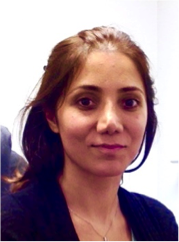Colloquia & Guest Speakers
Non-Hermitian Photonics: Optics at an Exceptional Point
Prof. Mercedeh Khajavikhan, University of Southern California
Monday, March 2, 2020
3:30 p.m.
Goergen 101

Abstract:
In recent years, non-Hermitian degeneracies, also known as exceptional points (EPs), have emerged as a new paradigm for engineering the response of optical systems. At such points, an N-dimensional space can be represented by a single eigenvalue and one eigenvector. As a result, these points are associated with abrupt phase transitions in parameter space. Among many different non-conservative photonic configurations, parity-time (PT) symmetric systems are of particular interest since they provide a powerful platform to explore and consequently utilize the physics of exceptional points in a systematic manner. In this talk, I will review some of our recent works in the area of non-Hermitian (mainly PT-symmetric) active photonics. For example, in a series of works, we have demonstrated how the generation and judicial utilization of these points in laser systems can result in unexpected dynamics, unusual linewidth behavior, and improved modal response. On the other hand, biasing a photonic system at an exceptional point can lead to orders of magnitude enhancement in sensitivity- an effect that may enable a new generation of ultrasensitive optical sensors on-chip. Non-Hermiticity can also be used as a means to promote or single out an edge mode in photonic topological insulator lattices. Rotation sensors play a crucial role in a diverse set of applications associated with navigation, positioning, and inertial sensing. Most optical gyroscopes rely on the Sagnac effect induced phase shift that scales linearly with the rotational velocity. In ring laser gyroscopes (RLGs), this shift manifests itself as a resonance splitting in the emission spectrum that can be detected as a beat frequency. The need for ever-more precise RLGs has fueled research activities towards devising new approaches aimed to boost the sensitivity beyond what is dictated by geometrical constraints. In this respect, attempts have been made in the past to use either dispersive or nonlinear effects. Here, we propose a new scheme for ultrasensitive laser gyroscopes that utilizes the physics of exceptional points. By exploiting the properties of such non-Hermitian degeneracies, we show that the rotation-induced frequency splitting becomes proportional to the square root of the gyration speed- thus enhancing the sensitivity to low angular rotations by orders of magnitudes. We will then describe a possible modification of a standard RLG to support an exceptional point, and measure the resulting enhanced sensitivity in the proposed system.
Bio:
Professor Mercedeh Khajavikhan joined the faculty of the University of Southern California in the Ming Hsieh Department of Electrical Engineering in August 2019 as an Associate Professor. She received her Ph.D. in Electrical Engineering from the University of Minnesota in 2009. Subsequently, she joined the University of California in San Diego as a postdoctoral researcher, where she worked on the design and development of nanolasers, plasmonic devices, and silicon photonics components. In August 2012, she started her career as an Assistant Professor in the College of Optics and Photonics (CREOL) at the University of Central Florida (UCF), working primarily on novel phenomena in active photonic systems. At UCF, she was promoted to the Associate Professor rank in 2018. She is the recipient of the NSF Early CAREER Award in 2015, the ONR Young Investigator Award in 2016, the DARPA Young Faculty Award in 2018, the University of Central Florida Reach for the Stars Award in 2017, and UCF Luminary Award in 2018. She is currently holding the IBM Early Career Chair at USC.
Location: Goergen 101
Refreshments will be served.
